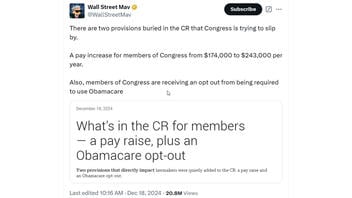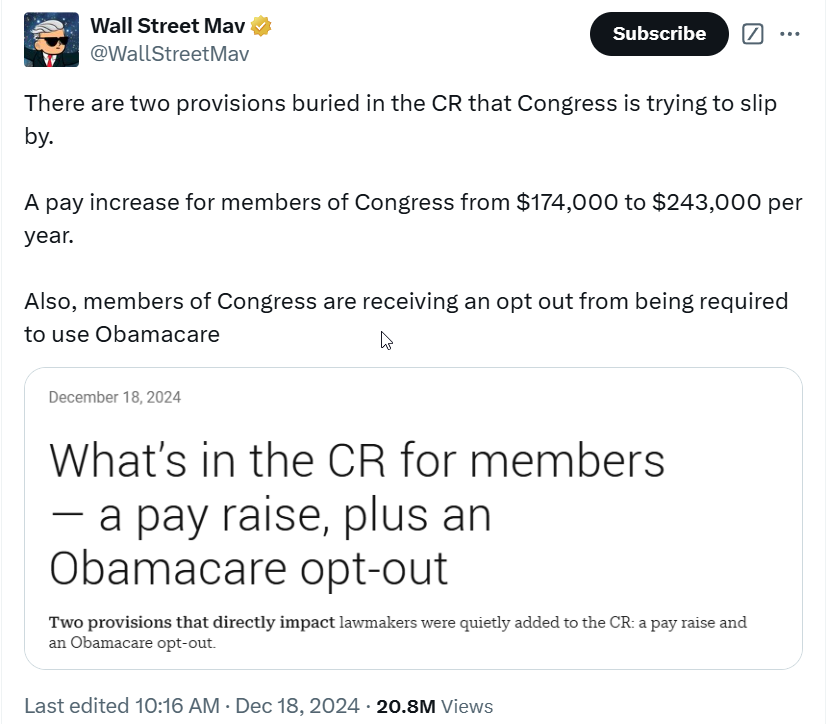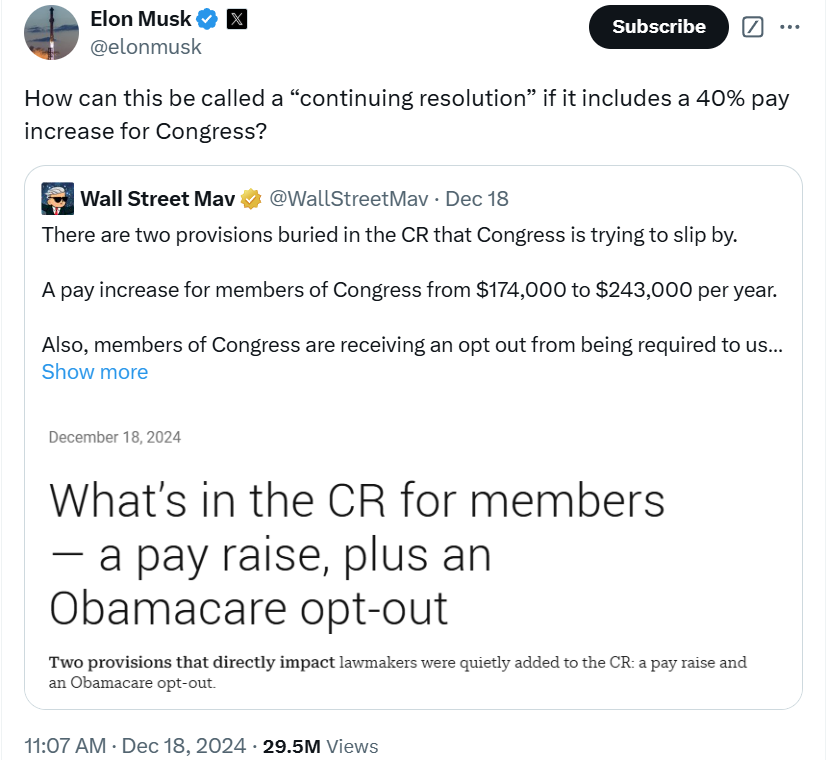
Did a draft continuing resolution or spending bill in late 2024 include a 40 percent salary increase for members of Congress? No, that's not true: The proposed December 2024 temporary funding package included a 3.8 percent pay raise, which would increase their annual salary from $174,000 to $180,600 if approved. Under the Ethics Reform Act of 1989 Congress is allowed to vote for a yearly pay adjustment that can't go below zero or be more than 5 percent, so 40 percent would be legally impossible.
The claim appeared in a post (archived here) on X on December 18, 2024, with a screenshot saying "What's in the CR [continuing resolution] for members -- a pay raise, plus an Obamacare opt-out." The post's caption said:
There are two provisions buried in the CR that Congress is trying to slip by.
A pay increase for members of Congress from $174,000 to $243,000 per year.
Also, members of Congress are receiving an opt out from being required to use Obamacare
This is what the post looked like at the time of writing:
(Source: X screenshot taken on Thu Dec 19 16:50:51 2024 UTC)
The post doesn't give any proof to support its assertion that a CR to keep the U.S. government running through March 2025 also included a 40 percent raise for lawmakers. The pay increase the post claims -- from $174,000 to $243,000 -- would be about 40 percent.
Elon Musk
Elon Musk, the majority owner of X and President-elect Donald Trump's appointee to lead a new "Department of Government Efficiency," shared this false claim on social media, where it has been seen by tens of millions of people. In his December 18, 2024, repost, Musk asked, "How can this be called a 'continuing resolution' if it includes a 40% pay increase for Congress?" Musk's post (archived here) appears below:
(Source: X screenshot taken on Thu Dec 19 17:07:23 2024 UTC)
Continuing resolution
The proposed continuing resolution (archived here), a temporary spending bill that keeps the federal government running when Congress and the president haven't approved a full budget yet, doesn't include a 40 percent pay raise for members of Congress and wouldn't boost their salary from $174,000 to $243,000 per year.
Under the Ethics Reform Act of 1989 (archived here), Congress is entitled to a yearly pay adjustment called the Employment Cost Index (ECI). This is based on changes in private-sector wages. The ECI can't go below zero or be more than 5 percent.
According to a September 26, 2024, report from the Congressional Research Service (CRS) (archived here), the last time members of Congress received a raise was in January 2009, when their salary was bumped to $174,000. As of December 19, 2024, Congress had refused all subsequent pay increases.
A closer look at the CRS report shows the social media post misrepresented the numbers included in the report in order to come up with a 40 percent pay hike for Congress. The report spells out what sort of raise Congress could get in the new year if members voted to accept one:
The maximum potential January 2025 adjustment is 3.8%, which would result in a salary of $180,600, an increase of $6,600. The House-reported (H.R. 8772, which failed on passage in the House) and Senate-reported (S. 4678) versions of the FY2025 legislative branch appropriations bills each included a provision to freeze congressional salaries in 2025.
The claim of congressional pay going from $174,000 to $243,000 per year isn't legally possible based on the ECI, the CRS report says:
If Members of Congress had received every adjustment prescribed by the ECI formula since 1992, and the statutory limitation (2 U.S.C. §4501) regarding the percentage base pay increase for GS employees remained unchanged, the 2024 salary would be $243,300.
Bottom line: Congressional pay would have increased from $174,000 to $243,000 annually if Congress had accepted raises over the last 15 years but it didn't. If and when a new continuing resolution is approved by Congress, it may or may not include a raise. But, if it does, it will be no more than 3.8 percent.
Read more
Other fact check agencies have also reviewed this claim, including FactCheck.org and VERIFY.
Other Lead Stories fact checks on claims involving Elon Musk can be found here. Additional Lead Stories fact checks on politics and Congress can be found here and here.



















